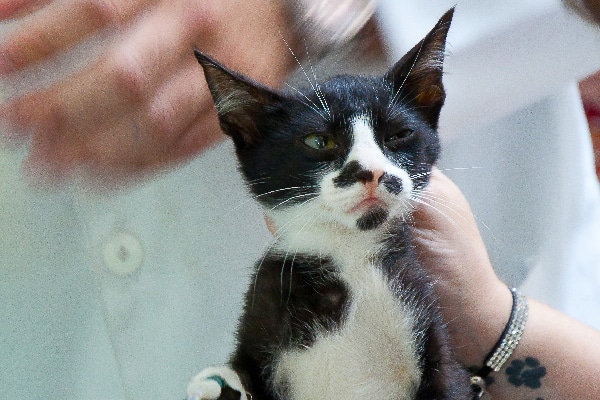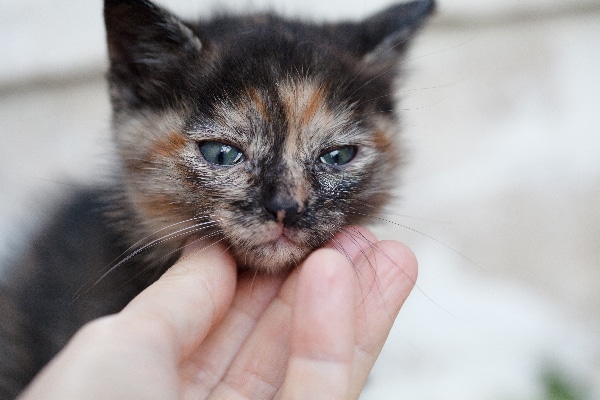Is your cat’s runny nose normal or a sign that she’s sick and needs to see a vet? Let’s find out.
Is Your Cat’s Runny Nose a Cause for Concern?

“Most cats do not normally have nasal discharge,” says Aimee Simpson, VMD, medical director of VCA Cat Hospital of Philadelphia. “That being said, many cats are chronically infected with feline herpesvirus (FHV-1) and these cats may have serous (clear) nasal discharge and/or black debris in the nostrils.”
What’s Causing Your Cat’s Runny Nose?
If you see clear nasal discharge coming from your cat’s nose, this usually indicates that the cat might have a viral infection or allergies. “Colored (usually yellow or green) nasal discharge is due to the presence of white blood cells and dead tissue as occurs with secondary bacterial infections and chronic rhinitis (inflammation of the nose),” Dr. Simpson explains.
The most common cause of a cat’s runny nose is upper respiratory disease complex. “Feline calicivirus (FCV) and feline herpesvirus (FHV-1) are widespread in the feline population,” Dr. Simpson says. “Following an acute viral infection, many cats remain chronically infected and shed virus continuously in the case of FCV or intermittently (with FHV-1).”
Less commonly, a cat’s runny nose might be caused by things other than viral infections. Nasal tumors, a foreign object stuck in the nose or tooth root abscesses can cause nasal discharge in cats. If the discharge is coming from only one side of the nose, or if one side of the face looks swollen, the vet might suspect one of these causes.
How Are Runny Noses in Cats Diagnosed?
If your vet suspects your cat’s runny nose is due to a viral infection, it’s possible to test for different viruses — but this may not be necessary or helpful. “Viral isolation can be done from swabs of the oropharynx or nasal cavity, but many healthy cats are chronic carriers so testing positive for an upper respiratory virus does not necessarily implicate this virus as the cause of the current clinical signs,” Dr. Simpson explains. “Diagnosis and treatment may be based on the patient’s history — for example, adopted from a shelter or recent stress in the household — rather than test results.”
How Will Your Cat’s Runny Nose Get Treated?
If your vet suspects a viral infection, initial treatment of a cat’s runny nose typically includes an antiviral medication and/or antibiotic. Ongoing cases might require some anti-inflammatory steroids.
If the vet treats your cat for a suspected viral infection, but your cat doesn’t respond to the medications, the vet might recommend anesthetizing your cat so she can do an oropharyngeal exam to check for polyps, as well as x-rays, a CT scan or rhinoscopy to check for other masses or tooth root abscesses.
Plus, suffering from a runny nose yourself? Can you really use a neti pot to stop your runny nose? We find out >>
Thumbnail: Photography ©Angelafoto | iStock / Getty Images Plus.
This piece was originally published in 2018.





